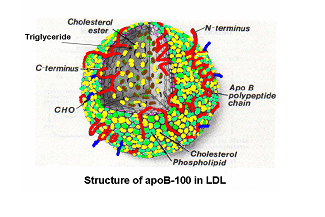Apolipoprotein B100 (apoB100)

What is Apolipoprotein B100 (apoB100)
Apolipoprotein B100 (apoB100) is a protein on the surface of lipid molecules that directs the lipid’s route of METABOLISM. ApoB100 occurs primarily on low-density lipoprotein (LDL) molecules, the form of cholesterol with the highest risk for CORONARY ARTERY DISEASE (CAD). The normal level of apoB100 in the blood is 40 to 125 milligrams per deciliter (mg/dL). Elevated levels suggest familial HYPERLIPIDEMIA. ApoB100 levels also rise after MYOCARDIAL INFARCTION, when there is damage to the HEART MUSCLE. Elevated apoB100 levels convey an increased risk for ATHEROSCLEROSIS and CAD.
See also CARDIOVASCULAR DISEASE PREVENTION; CHOLESTEROL BLOOD LEVELS; HYPERLIPIDEMIA; RISK FACTORS FOR CARDIOVASCULAR DISEASE.